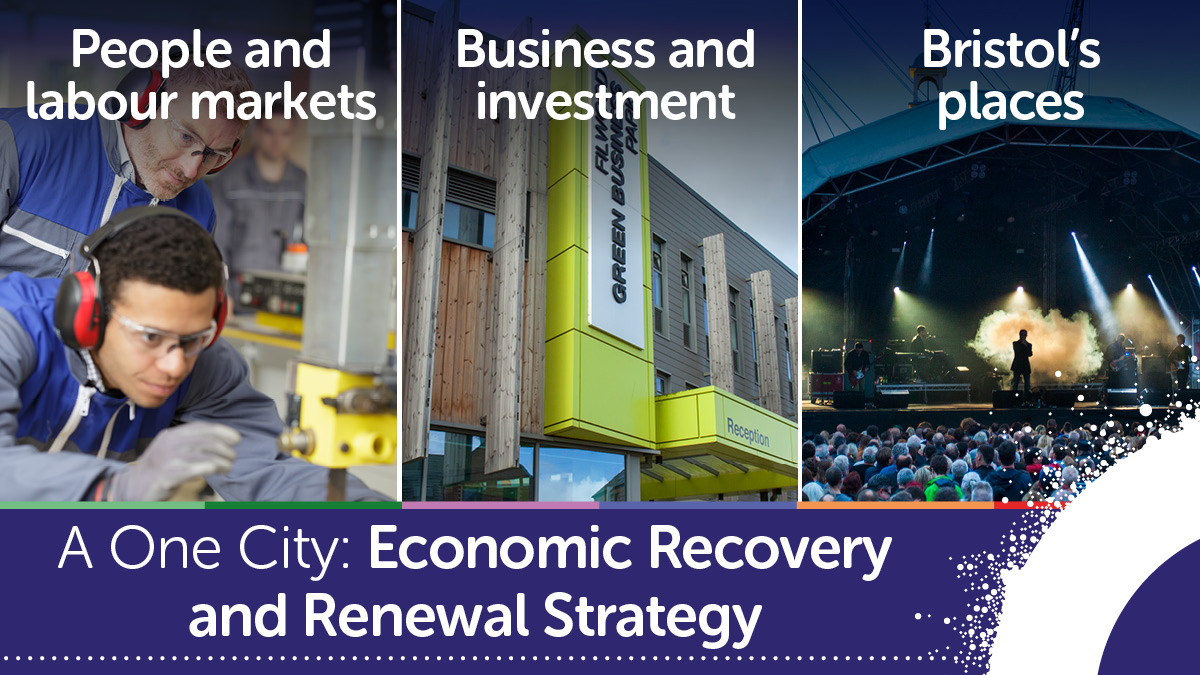Bristol’s One City partners have launched an urgent strategy to support the economy as the city faces the biggest financial depression in recent years.
The continuing impact of COVID-19 on businesses has seen Bristol’s unemployment rate more than double to 4.5% from March to August this year, and over 70,000 people in the city have been furloughed. In the face of this crisis, Bristol City Council plans to allocate £10m, over the next two years to support the immediate challenges being faced by businesses and citizens alike. As well as the immediate need to respond, city partners have also recognised the need to look ahead.
As such, many organisations across the city have inputted into Bristol’s Economic Recovery and Renewal Strategy which seeks to reduce poverty and inequality; increase the city’s resilience and environmental sustainability; and enhance the economic and social wellbeing of every community.
Bristol Mayor, Marvin Rees, said: “As Bristol faces the deepest economic depression since the 1930s it is imperative that we work together now to do all we can to keep those working to stay in work, help businesses to stay open, and provide new opportunities for those who are unemployed.
“The scale of the challenge presented by COVID-19 is significant and testing every system in our city. Livelihoods are being devastated. We must support business, promote innovation and work to attract new and established businesses into the city.
“We must stimulate the economy with infrastructure and regeneration projects that offer jobs, homes and investment opportunities to the city. It is without doubt that working in collaboration with businesses and partners across the city was, and will continue to be, a key strength and foundation of Bristol’s long-term economic response and recovery.
“The city’s recovery from COVID-19 must acknowledge that tackling poverty must go hand in hand with improving health and education, reducing inequality, stimulating growth and tackling climate change.”
More than 300 City partners have been engaged with to contribute to a strategy that is built around three pillars; People and labour markets, Business and Investment and Bristol’s Places. Each pillar identifies priorities for response and recovery. A detailed analysis of the evidence and context for each pillar is also provided, with inclusion and sustainability at the heart of all three pillars.
Reflecting on the priorities of the strategy, Sado Jirde, Director, Black South West Network said, “This Economic Recovery Strategy places inclusive economic development at its core by catalysing inclusion to implement a shared agenda that expands opportunity. Recovery must include the voices of those too often left out of the design of initiatives developed to help them. To truly build community resilience, reduce income inequality and ultimately achieve any Sustainable Development Goals, community voice must be at the centre of any meaningful recovery strategy to enable these lived experiences to move beyond just being a powerful story, but actually affect real change.”
Bristol is not alone facing these challenges, and a big priority for the partners is to build on the work of and alongside many others around the globe. To this end, all of the priorities in the strategy are clearly benchmarked against the United Nations Sustainable Development Goals (SDGs). This will allow us to measure progress and ensure transparency within the city and with external partners.
James Durie, Chief Executive of Bristol Chamber of Commerce at Business West, and Co-Chair of Bristol’s Economy Board, said: “This strategy does not aim to simply steer our economy back to where it was at the start of the year, and recreate all the challenges that existed then. Instead, it aims to build a renewed economy. It aims to build a sustainable, carbon neutral and ecologically positive economy. It aims to build a fair, inclusive economy that supports growth in all our communities. It is closely aligned with the goals of our partners across the West of England, and it is measurable against the UN Sustainable Development Goals. And it is informed by an extensive programme of sector and community engagement.
The next step is to develop an Action Plan, setting out how we will meet these priorities, how much it will cost, when it will be achieved by, and who will need to get involved. Answering these questions will help make this more than just a document, and bring the One City Approach to life, but it will take a concerted effort from many different city partners working together. We are convinced that together, the city’s economy will not only be recovered, but renewed.”
The Economic Recovery and Renewal Strategy brings together vital strands across the city to help ensure collaboration in delivering our plans within the city and engaging with those outside it; including regional representation from the West of England Combined Authority to ensure its alignment with emerging regional recovery planning.

